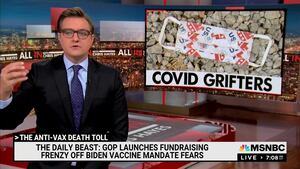On Oct. 24, Taylor Swift graced NBC’s Studio 6A to promote her latest album in front of The Tonight Show’s audience. Four days later, Chris Hayes stood in that same studio for a live taping in front of his own, warning the live crowd of the threats to democracy imperiling the nation.
It was Hayes’ first time hosting All In before a live audience since March 6, 2020, a date the MSNBC host repeatedly joked about having given his audience “free COVID.” Two and a half years later, he had scrapped a monologue on the politics of crime for a sober reflection on the assault on Paul Pelosi, who was attacked that morning by a suspect who was obsessed with far-right conspiracy theories and allegedly told the feds he intended to “kneecap” House Speaker Nancy Pelosi. The issue at large was political violence, and the issue on set was how to square the seriousness of the news with a buzzing live audience.
“There’s a sort of communal feel that we like about [live shows], like we’re all sort of figuring out the news together,” Hayes told The Daily Beast after the show. “And so on a day when the lead story is just, like, utterly upsetting and grisly as today’s is, I’m just a little, like, nervous about making that appropriate and correct tone-wise, but I think we did.”

It helped that the half-masked audience was thoroughly briefed beforehand. With on-set applause cues, routine reminders from producers, and in-studio appearances from Reps. Alexandria Ocasio Cortez (D-NY) and Rep. Jamie Raskin (D-MD), the audience of just under 200 were reminded of the scourge of efforts to intimidate politicians and the Republican Party’s embrace of authoritarianism.
The goal, if unspoken, is to keep these issues front of mind for viewers as they head to the polls in under two weeks—until Republicans likely take control of Congress, that is. Then Hayes doesn’t know what he’ll do.
The Daily Beast spoke with Hayes in a Tonight Show green room just after his show on Friday, where he discussed his plans for his live shows, whether people have taken threats to democracy seriously enough, and the role of news organizations in covering such threats. This interview has been edited for length and clarity.
What was the show going to look like before the attack on Paul Pelosi?
We had a long monologue. I had written a long monologue that we had produced and everything—it’s sort of like an examination of the crime and the politics of crime, particularly the sort of combination. I think I’m going to do it on the show next week, so I don’t want to cannibalize myself. But, um, but that was what we were gonna do and then we were like, obviously, this is the top story.
The crowd, even with the topic at hand, was still pretty electric. I heard something like 2,000 people applied for tickets within the first hour for just 200 seats. The crowd that came are people who watch you avidly, and you brought on two top lawmakers in two Democratic stars. Did you reach out to any Republicans about coming out, especially for this crowd to hear from them?
We’ve had Republicans on the last show before. For this we wanted—we tried a bunch of different people. It’s a question of like, “Who could be here?” We got them pretty early on, so then we stopped because we're not gonna say no to Alexandria Ocasio Cortez and Jamie Raskin. But I like talking to all sorts of people.
With some of the political violence that has seemingly gotten worse over the last five years, how do you think viewers and voters should keep some of that in mind about where we go from here if Republicans do take Congress?
The first thing is that political violence is toxic and unacceptable in all circumstances. It has a particular kind of toxicity and degrading quality. In the context of liberal societies and free and open societies. Obviously, there's circumstances like the Warsaw Ghetto, which I guess you can call political violence. But that's the first thing right? The other thing is like, if Republicans take the House, you use the tools at your disposal in a free and open society. Those tools are the tools of petitioning the government, civic society, institutions, rule of law, to like, fight for democracy and resist, you know, anti-democratic movements.
How do you do that in a way that speaks to people who are receptive to—not political violence, but just to the people who follow leaders of that movement like Donald Trump? How do you speak to those people who are watching conservative media, not just people who are watching MSNBC?
I would say that people talk about these sort of bubbles all the time, which is true, but I also think, like, there's a lot of persuasion and change of heart that happened, like a lot of people changed their politics in the Trump era. A lot of people went from being Republicans—diehard Republicans—to being, like, hardcore MSNBC liberals, and a lot of people went in the opposite direction. So when you think about that, it’s like people’s views do change, persuasion does happen and I meet viewers all the time who were not liberals or don’t even consider themselves liberals now or who disagree with me on a bunch of stuff. So I do think that sometimes we overestimate the degree of complete ideological straitjackets that folks are in.
What do you hear from those viewers who say “I’m not a liberal”?
There’s different things. There’s some people who are politics junkies, who sample the different shows. There’s a lot of people whose politics were really changed by Donald Trump. That started being like, “I don’t like this at all. This is not what I signed up for. This not what I believe in.” But then it starts at one point and sort of moves to other things. And, you know, that’s a very gratifying thing. I mean, you’re talking to millions of people every week. You know, if you got every viewer of my network on my show in a room, there’d be some things they all agree on, but like, not really, like, if you get a million people together, 2 million people together.
When you were describing the attack, you talked about Donald Trump’s role as being a leader of a movement that has perpetuated political violence, the largest case being the Jan. 6 riots. If a moderate viewer was just casually turning on your show and they hear that, isn't there some risk there of them thinking “Oh, they’re overhyping him. He’s just a big man, big talker, etc.”? Is there a risk of categorizing all the people that follow him as being capable of violence?
Well, I don’t think all the people that follow him [are violent]. I think that part of what my job is and I think part of the thing we take very seriously is just being very specific in how we were communicating things right. So we were careful in how we communicate with them, right? We talked about political violence happening against Brett Kavanaugh. Steve Scalise, we talked about why this was in a separate category, the reasons for that, the examples. So I think that when you’re communicating in this format, you have to try to persuade, right? You can’t just like to claim, right? So I’m trying to persuade people in my point of view. So when I say, “Look, here’s an example and I think he’s in a different category for this reason. Here’s the examples of it like he painted a target, or they went there, he sent them to the Capitol. Here’s the quote he gives afterward, you know, they gotta be careful. People are getting angry.” I’m trying to make my case there. I’m not just telling you assuming people agree with me.
You talked a lot about threats to democracy. The Democrats are running on that, framing it as central to everything. A lot of media organizations have had beats or beats adjacent to that, whether it’s “democracy desks” or “Guns in America,” which stem from that to an extent. Do you think they’re doing a good enough job informing readers and voters about these issues? Or do you think, at least something I’ve noticed is that there are a lot of stories about those desks versus the work they’re doing?
I actually think the coverage in the space has gotten much better. I do think you’re in some ways climbing an uphill battle, because I don’t blame people for finding it somewhat abstract, you know, or like, as vital as it is, I think that like, this is a natural tension in a democracy, which is that public opinion, public opinion tends to be relatively fickle. It can tend to be very sort of, what they say in the political science literature is “thermostatic,” moves against the party in power. And so the natural ebbs and flows in political public opinion aren't themselves enough to guarantee democracy, because you need other institutions, a free press, civil society, the rule of law—all that stuff. And so I’m psyched to see the democracy desks, I’m psyched to see people carving out this niche and I do think there has been like a fair—like, look, the local network news in Arizona, which I don’t think has a democracy desk, they’ve done a good job of covering these folks showing up at ballot drop boxes. That’s good journalism. This is the thing that’s happening, they’ve gone out there, they’ve interviewed them. So I actually think some of the journalism on this beat, whether it's at the democracy desk or not, it’s been great.
We’re talking about this in October 2022. A lot of those desks have formed in the last six months or so, and people are still not fully sold on it being a major issue. Do you think that since it wasn’t solidified as “this is a threat” a year and a half ago when the Capitol was attacked, it’s hard to reach those people 20 months later?
Generally, I think the sort of institutions of civil society, and particularly the most prominent ones, have been a little slow to realize just how acute the threat is. And I think that’s something that we were pretty upfront about. I think we’ve been unfortunately proven right about it. But I do think there’s been a little bit of a lag of people understanding. Even now you’re seeing it, it’s like, “Oh, wow, he’s organizing on Truth Social to go watch ballot boxes.” It’s like, yeah, of course he is.
Let’s say Democrats lose Congress and we have Donald Trump as a more formidable leader of an emboldened Republican Party. You also have Elon Musk, who has fed into some of those conservative grievances, running Twitter now. What does that conversation look like in six months? What does your show look like in January?
I have no idea. I don’t predict the future anymore, because I remember giving interviews about how we’re going to cover the primaries in February 2020. [Laughs]. So I have no idea. The experience of the last five years between the election of Donald Trump, his presidency, the pandemic, the first ever sort of attempted coup, violent attempts to hold power, and then a war on the European continent, like full-out land war in Europe. I’m just prepared for anything.
You said you want to do more live shows in 2023. If Republicans take power in January, your viewers may be a little disheartened about the country. What do you want to say to their faces, as you did tonight, to make them feel a bit more reassured?
My favorite essay text is by Albert Camus, The Myth of Sisyphus, which is about an eternal struggle. Sisyphus rolls the rock up the hill and then it rolls back down. He rolls it back up the hill, and the last line of the essay is, “One must imagine that Sisyphus is happy,” and it’s about finding joy and meaning in struggle. And I think it’s really important for anyone who works in Democratic politics to understand that, like, we’re not on some train that’s going to some destination that we get there, we all get off, and then it’s like, “We’re here, everything works!” It’s never like that. It’s just constant. You’re just going to constantly be struggling. Democracy takes constant work. And so if Republicans take the House then, like, even more reason to use the tools at your disposal in a liberal democracy, through the means of our rights and freedoms and civil society to try to persuade people and petition for your view.





